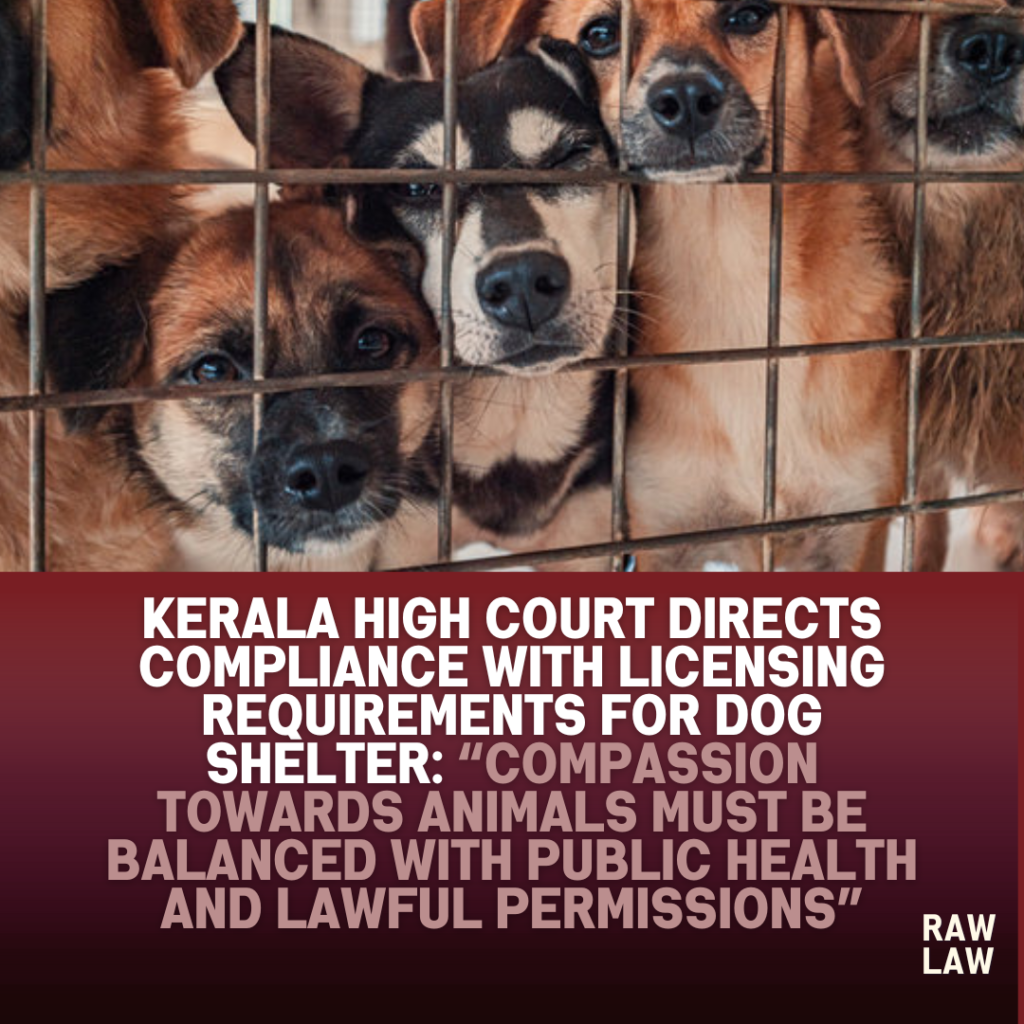Court’s Decision
The Kerala High Court in W.P.(C) No. 17343 of 2025 disposed of the writ petition filed by a woman running a community dog shelter, directing that if she wishes to continue the shelter, she must obtain requisite statutory sanctions. The Court emphasized:
“If the petitioner wants to continue to run the shelter home for dogs, she shall do so only after obtaining necessary sanction from the statutory authorities.”
Justice N. Nagaresh held that although the petitioner’s actions may be guided by compassion, fundamental duties under Article 51A(g) cannot override public health norms or licensing requirements.
Facts
The petitioner, involved in animal welfare, had established a community dog shelter at a rented residence, housing between 48–65 stray dogs. She claimed to have vaccinated, sterilized, and provided medical care in line with the Prevention of Cruelty to Animals Act, 1960 and the Animal Welfare Board of India guidelines.
She alleged that respondents 4 to 7 persistently threatened and intimidated her and her staff, damaged the shelter’s fencing, and even assaulted her. Police inaction prompted her to seek protection through multiple complaints, annexed as Exhibits P1–P12.
In response, respondents 4 to 7, including neighbors and landlords, filed counter affidavits asserting that the shelter caused severe nuisance due to unhygienic conditions, noise pollution, and foul odor. They cited complaints from local residents and an order from the Revenue Divisional Officer (RDO) dated 09.04.2025, directing relocation of the shelter due to public health concerns.
Issues
- Whether the petitioner’s shelter violated any statutory or environmental norms.
- Whether the petitioner was entitled to police protection despite local objections.
- Whether Article 51A(g) rights can override public health and residential zoning concerns.
Petitioner’s Arguments
The petitioner contended that she was discharging a fundamental duty under Article 51A(g) of the Constitution by caring for stray dogs. She asserted that her activities were legal and humane, conducted in accordance with animal welfare laws. The repeated attacks on her person and property, coupled with the failure of police to act, necessitated Court intervention for protection.
Respondent’s Arguments
The respondents argued that the petitioner misrepresented her intentions when renting the premises, initially claiming she only had two or three pet dogs. Instead, she housed over 60 stray dogs, creating a public nuisance. They contended that the shelter lacked sanitary arrangements, caused noise and odor pollution, and was unauthorized. Several local complaints had been filed, leading to official inquiries and orders mandating relocation of the dogs.
Analysis of the Law
The Court analyzed the balance between individual fundamental duties and collective public rights. While Article 51A(g) encourages compassion towards living creatures, the right must be exercised within the framework of law and public health norms. The absence of statutory clearances or licenses made the operation of the shelter unauthorized.
Precedent Analysis
The Court relied on its earlier ruling in Irshad T.M. v. State of Kerala, 2024 (2) KLT 248, which held:
“To run a stray dog shelter, the petitioner should approach the Local Self Government Institution for getting licence for keeping the stray dogs in a premises.”
This precedent established the requirement for statutory compliance before such shelters could legally operate.
Court’s Reasoning
The Court found that:
- The petitioner was housing over 60 dogs without necessary permissions.
- Reports from Health Inspectors and the Environmental Engineer confirmed unhygienic conditions and nuisance caused by barking, odor, and food waste.
- Authorities such as the RDO had issued clear directions to shift the dogs.
Given that the dogs had already been moved, the Court observed there was no immediate threat or cause for concern.
Conclusion
The writ petition was disposed of with a direction that the petitioner may resume shelter operations only after obtaining the requisite statutory licenses. If she faces threats despite compliance, she may approach the concerned police authorities.
Implications
This ruling underscores the necessity of regulatory compliance when undertaking activities motivated by public interest or fundamental duties. It affirms that private compassion, even when rooted in constitutional duties, must be exercised without compromising public health, hygiene, and local order.
Referred Case Summary
- Irshad T.M. v. State of Kerala, 2024 (2) KLT 248
- Held that permission from local bodies is mandatory to run a dog shelter. This case was applied directly to hold that the petitioner must obtain necessary licensing before operating such a facility.
